biotechrabbit™ RevertUP II Reverse Transcriptase is a proprietary MMuLV reverse transcriptase engineered by point mutations resulting in increased temperature stability up to 60°C. This guarantees top performance with templates showing a high degree of secondary structures. The enzyme has no RNase H activity and ensures efficient synthesis of ≥19 kb cDNA.
RevertUP Reverse Transcriptase is a DNA polymerase which uses RNA as a substrate and exhibits no measurable proofreading 3'→5' exonuclease function. This enzyme performs cDNA synthesis by extending a DNA primer annealed to an RNA template; it can also make copies of single-stranded DNA templates.
Component | Composition |
RevertUP II Reverse Transcriptase | RevertUP II Reverse Transcriptase, 200 U/µl, in storage buffer containing 50% (v/v) glycerol. |
5× RevertUP II Buffer | Optimized 5× RevertUP II Reverse Transcriptase reaction buffer. |
STORAGE | -20°C (until expiry date – see product label) |
Unit Definition
One unit is the amount of enzyme activity that incorporates 1 nmole of dTTP into acid insoluble fraction in 10 minutes at 42°C when poly(A)+ RNA and oligo(dT)20 are used as template–primer.
Quality Control
Exonuclease assay
Linearized lambda/HindII fragments are incubated with the Reverse Transcriptase in a 50 µl reaction mixture for 4 h at 37°C. No degradation of DNA was observed.
Endonuclease assay
lambda DNA is incubated with the Reverse Transcriptase in a 50 µl reaction mixture for 4 h at 37°C. No degradation of DNA was observed.
Nick Activity
Supercoiled plasmid DNA is incubated with the Reverse Transcriptase in a 50 µl reaction mixture for 4 h at 37°C. No conversion of covalently closed circular DNA to nicked DNA was detected.
E. coli genomic DNA contamination assay
A sample of Reverse Transcriptase is analyzed with specific primers targeting the 16S rRNA gene in qPCR for the presence of contaminating E. coli DNA. No E. coli DNA was detectable.
RNase Assay
A sample of the enzyme was incubated with a RNA template. RNase activity was not observed after agarose gel electrophoresis.
Functional Assay
cDNA synthesis with specific primers, followed by quantitative PCR.
Prevention of cDNA synthesis reaction contamination
RNase contamination is an exceptional concern when working with RNA. RNase A, providing most threat to RNA integrity, is a highly stable contaminant of any laboratory. To prevent RNA from degradation and to minimize possibility of contamination during cDNA synthesis; follow the guidelines below:
- Use separate clean areas for preparation of the samples and the reaction mixture.
- DEPC-treat all tubes and pipette tips or use certified nuclease-free labware with aerosol filters.
- Wear fresh gloves when handling RNA and all reagents.
- Always assess the integrity of RNA prior to cDNA synthesis in denaturing agarose gel electrophoresis.
- Use RNase free water and other reagents.
- To prevent RNA from degradation, add Ribonuclease inhibitor (optional) in to the cDNA synthesis reaction (20 units for 20 µl reaction).
Typical cDNA synthesis reaction set up
- Thaw on ice and mix very well all reagents.
- Assemble and keep all reactions on ice.
- To use time and reagents effectively, always prepare master mix for multiple reactions. For a master mix volume, always calculate the number reactions that you need plus one additional.
- Combine the following in an RNase-free reaction tube:
Component | Volume | Final concentration |
dNTP Mix (10 mM each dNTP) | 2 µl | 1 mM (each dNTP) |
RNase Inhibitor, 40 U/µl (optional) | 0.5 µl | 1 U/µl |
Oligo (dT)12–18 (10 µM) – or Hexamer Primer (25 µM) – or Gene Specific Primer (10 µM) | 0.5 µl 1 µl 0.5 µl | 0.25 µM 1.25 µM 0.25 µM |
5× RevertUP II Buffer | 4 µl | 1× |
RNA Template | 0.1–1 µg total RNA or 50–500 ng mRNA (polyA) |
|
RevertUP II Reverse Transcriptase | 1 µl | 10 U/µl |
RNase-free water | Variable |
|
Total volume | 20 µl |
|
- Mix and collect the drops by centrifuging briefly.
- When using
- Hexamer Primer, incubate 10 minutes at 30°C followed by 42–55°C for 20–60 minutes
- Oligo (dT) or gene-specific Primer incubate at 42–55°C for 20–60 minutes.
- Inactivate enzyme at 99°C for 5 minutes.
- Collect the drops by spinning briefly.
- Store products at –20°C or proceed to next step, like PCR or qPCR.
- Use maximum 10 µl of the cDNA synthesis reaction mix for PCR in 50 µl volume.
You may also be interested in the following product(s)
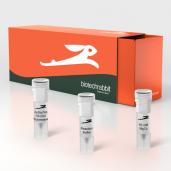
ApStarTaq™ Hot-Start DNA Polymerase, 5 U/µl
Package Sizes |
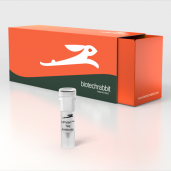
UPstart™ Taq Antibody, 1 mg/ml
Package Sizes |
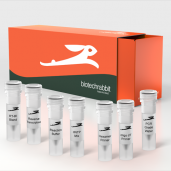
cDNA Synthesis Kit
Package Sizes |
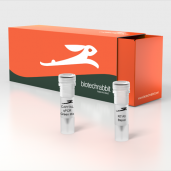
4X CAPITAL™ 1-Step qRT-PCR Green Master Mix
Package Sizes |
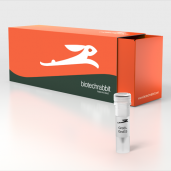
RTS GroE Supplement
Package Sizes |
